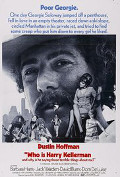
Directed by
Ulu Grosbard
108 minutes
Rated MA
Reviewed by
Bernard Hemingway

Who Is Harry Kellerman And Why Is He Saying Those Terrible Things About Me?
Released the same year as El Topo, Ulu Grosbard’s film is typical enough of the drug-hazed meanderings of the hippie era. Like most of the films of its ilk, shorn of its context it does not hold up very well.
Dustin Hoffman plays Georgie Soloway, supposedly a hugely successful song-writer (64 songs in one year, not including two peace marches, a commercial and a cancer jingle) who lives in an ultra-mod Fifth Avenue apartment. Georgie has been in therapy for years, divorced for some of them, is suffering from insomnia and is suicidal. He claims that someone called Harry Kellerman is contacting all his friends and telling them stories in order to discredit him.
I say ‘supposedly’ a hugely successful song-writer because the songs we hear and that are presumably supposed to be taken as Georgie’s are Shel Silverstein-style country rock ditties (the real band Dr. Hook and the Medicine Show appear performing one of them) of little merit and hardly warrant the cover of Time magazine as is the case here,
That however is really not the most significant problem with Who Is Harry Kellerman and Why Is He Saying Those Terrible Things About Me? which rambles its way through George’s spiritual crisis as he drops in (literally) on his psychiatrist (Jack Warden) and visits old friends or gets them to visit him. We get flashbacks as George reflects on his life and fantasy sequences, most of which involve Warden in different guises. Only briefly in a sequence in which George meets a quietly sad woman (Barbara Harris) auditioning for some stage show that he is involved in does the film depart from its comedically absurdist and nursery rhyme musical style (she sings ‘Painting the Clouds with Sunshine’ by Al Dubin and Joseph A. Burke). Almost needless to say it’s the best part of the film (Harris was, somewhat optimistically, nominated for a Best Supporting Actress Osca). Unfortunately it ends all too soon.
One can imagine that in its day the film with its themes of the shallowness of worldly success and depiction of New York as a kind of mad-house would have found a positive reception, particularly if enhanced by recreational drugs, but today it just looks like a string of unremarkable gags with no real development, one which will have some appeal to fans of early ‘70s interior design and those who can’t get enough of Dustin Hoffman who does the best he can with the dramatically limited material and is intermittently amusing.
Want something different?





